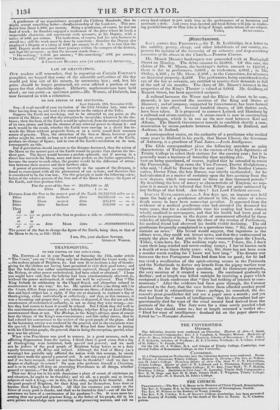SAUL. AMONG THE PROPHETS. — Sir T. B. Lethbridge, in a letter
to the nobility, gentry, clergy, and other inhabitants of our county, ex- presses his opinion of the necessity of an extensive and deep-searching corrective of the abuses in the Church.— Taunton Courier.
Mr. Monek Mason's bankruptcy was proceeded with at Basinghalf Street on Monday. The debts amount to 33,0001. Of this sum, the claims of Mr. W. Mason, the bankrupt's father, amount to 12,0001.; thieve is due to performers, 8,000/. ; to tradesmen, 4,000/. ; to Mr. Ottley, 4,500/. ; to Mr. Shaw, 2,500/. ; to the Committee, for advances on theatrical property, 2,500/. The performers, being considered in the eye of the law as servants, are entitled to receive their demands in full at the end of six months. The share of Mr. Mason's interest in the properties of the King's Theatre is valued at 9,0001. Mr. Goldney, of Regent Street, has been appointed assignee.
A railroad between the Weser and the Rhine is about to be com- menced ; it has received the sanction of the King and States of Hanover ; and a Company, supported by Government, has been formed: to carry it into effect. Several hundred shares, of 500 thalers each, have been taken. It is proposed to connect Lubeck and Hamburg by a railroad and steam-carriages. A steam-coach is now in construction at Copenhagen, which is to run on the new road between Kiel mid. Altona. The Danish Government intends to establish shortly a com- munication by steam-packets between Kalundborg, in Zealand, and. Aarhuus, in Jutland.
A correspondent states, on the authority of a gentleman who resided some years in Holland in his youth, that Baron Chasse, the Governor of Antwerp, is a grandson of Paul Jones.—Leeds Intelligeneer.
The Globe correspondent gives the following anecdote as quite characteristic of Toryism—" It is the custom of the high dignitaries of Trinity College to select their stations for the ensuing year ; but it is generally more a business of formality than anything else. The Pro- vost on being questioned, of course, replied that he intended to retain the Provostship. Next came the Vice-Provost, Doctor Hodgkinson ; who said, ' I shall be Bursar for the next year.' His brother Conser- vative, Doctor Prior, the late Bursar, was utterly confounded; for he had calculated as a matter of certainty upon the fees accruing from the new degrees, which may amount to three or four thousand pounds." By describing the love of money as characteristic of Toryism, we sup- pose it is meant to be inferred that Irish Whigs are quite unbiassed by any feelings of that kind. Are they? Let Lord Plunkett answer.
INQUEST EXTRAORDINARY.—A few days ago, an inquest was held upon the body of a gentleman advanced in life, the cause of whose death seems to have been somewhat peculiar. It appeared from the evidence of a medical gentleman who had attended the deceased for some years, that for a considerable time his reading had been almost wholly confined to newspapers, arid that his health had been good or otherwise in proportion to the degree of amusement afforded by those vehicles of intelligence. From the close of the session of Parliament, his medical friend had observed his health visibly declining. The old gentleman frequently complained in a querulous tone, " Sir, the papers• contain no news." His friend would suggest, that ingenious as the editors were, they could not invent news, and that they endeavoured to supply the place of that article by clever -comments upon the Church, Tithes, Corn-laws, &c. The uniform reply was, " Pshaw, Sir, I don't want their long-winded and never-ending essays ; I hav'nt known such a dearth of news these thirty years : why, Sir, there has not been even a murder worth reading for I know not how long." The dreamy war between the two Portuguese Dons had done him no good; for he had too vivid a recollection of the spirit-stirring scenes in the Peninsula and the Netherlands to derive any benefit from the pigmy warfare near Oporto. As for the Belgian question, and its threescore protocols, the very mention of it created a nausea. He continued gradually to decline; and at length was killed outright by receiving a paper which contained a frank confession that "they had nothing of interest to com- municate." After the evidence had been gone through, the Coroner, observed to the Jury, that the case before them afforded another proof that we lived in extraordinary times: perhaps, he remarked, the de- ceased's great grandfather did not see a paper once a month ; and yet such had been the " march of intelligence," that his descendant had un- questionably died for want of the usual mental food derived from the journals of the day. The Jury were for a time sorely puzzled what decision they should come to ; but at length returned a verdict of- " Died for want of intelligence : deodand 6d. on the paper above re- ferred to."—Worcester Journal.



























 Previous page
Previous page